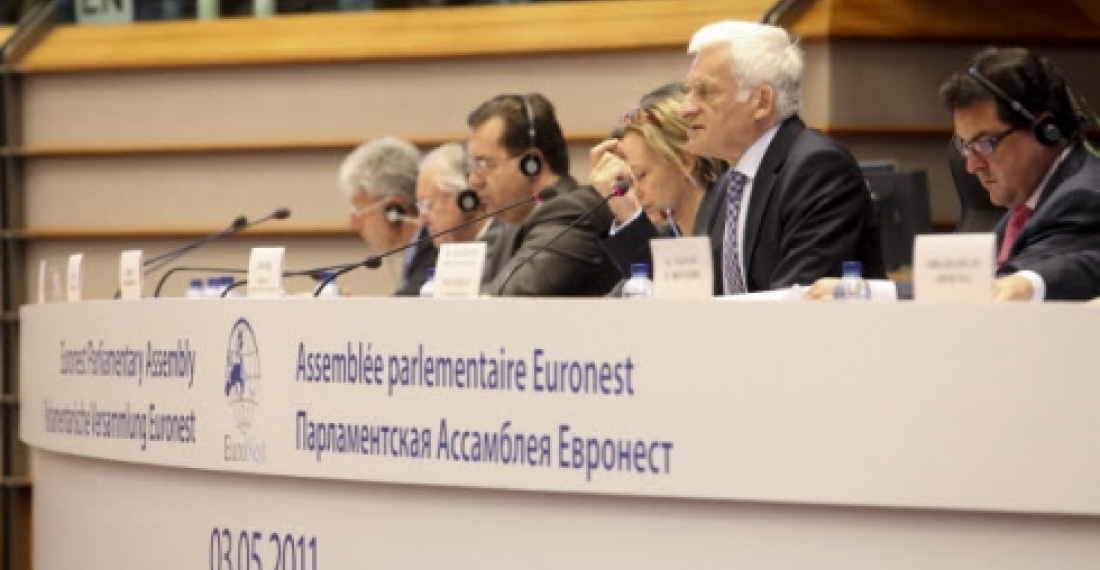South Caucasus Parliamentarians join in launch of the EURONEST Parliamentary Assembly
Brussels, 3 May 2011
Senior Parliamentarians from Armenia, Azerbaijan and Georgia joined colleagues from the Parliaments of Moldova and Ukraine, as well as members of the European Parliament for the inauguration of the EURONEST Parliamentary Assembly in Brussels on May 3rd. The Armenian delegation was led by the Speaker of the National Assembly, Hovik Abrahamyan, the Azerbaijani Delegation was led by First Deputy Speaker of the Milli Meclis, Ziyafat Asgerov and the Georgian Delegation was led by First Deputy Speaker of the Georgian Parliament, Mikhail Machavariani.
The aim of the body is to provide a parliamentary dimension to the EU\'s eastern neighborhood policy. \"We have created a powerful tool today,\" said EURONEST Co-President-elect Kristian Vigenin at the end of the constituent meeting.
The EURONEST Parliamentary Assembly\'s constituent meeting was opened by EP President Jerzy Buzek, who observed that the democratic reform processes of the eastern partner countries must be strengthened. \"Stable countries can only be democratic countries; democracy is the only way to stability,\" he said. He added that the Parliamentary Assembly was crucial in bringing citizens of this region closer together. \"If we want more cooperation and more integration, we have to start with parliamentary cooperation, because it represents contacts between people,\" he said.
Adjourning the meeting, Co-President Kristian Vigenin (photo left)emphasised that \"this assembly is one of two equal partner components: equal in rights and responsibilities\", and expressed his confidence that EURONEST members will live up to both. At a press point afterwards, he underlined that \"the establishment of this body is the strongest signal we could send\" about the potential for cooperation between the EP and the eastern partners. Co-President Borys Tarasyuk (Ukraine) echoed this view, and also appealed to all European Union institutions not to give in to the temptation to divert attention and funds from the eastern to the southern neighborhood.
The Parliamentary Assembly adopted and signed its constitutive act, approved its rules of procedure, set up two working groups (on Belarus and the Rules of Procedure) and formed four committees (one on Political Affairs, Human Rights and Democracy; one on Economic Affairs, legal approximation and convergence with EU policies, one on Energy Security and one on Culture, Education and Civil Society).
It also elected its two Co-Presidents, Messrs Vigenin and Tarasyuk, as well as 8 Vice-Presidents, to form a Bureau: Vahan Hovhannesyan (Armenia), Elkhan Suleymanov (Azerbaijan), David Darchiashvili (Georgia), Igor Corman (Moldova), Traian Ungurenau (EPP, RO), Ryszard Czarnecki (ECR, PL), Gerben-Jan Gerbrandy (ALDE, NL) and Jacek Saryusz-Wolski (EPP, PL).
The EURONEST Parliamentary Assembly consists of 60 MEPs and 10 MPs from each of the five eastern partner countries. Belarus is a special case: although a part of the eastern neighbourhood, there was much discussion about how to allow its participation in EURONEST without giving legitimacy to Alexander Lukashenko\'s regime. In the end, the constituent meeting was held without any representatives from Belarus in attendance.
Report prepared by commonspace.eu editorial staff with material from the Press Service of the European Parliament







